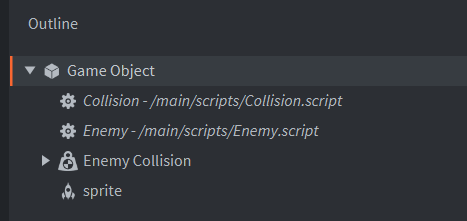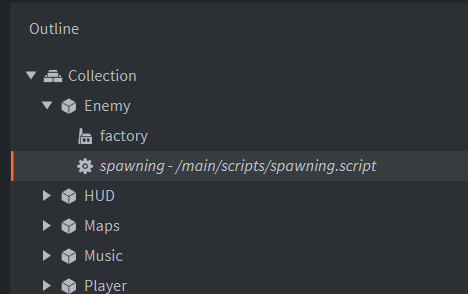I’m having trouble with implementing a go factory to spawn in enemy NPC’s, I get this error every time:
My .go file
My main.collection
This is the code in my spawning.script attached to my go factory
local p = go.get_position()
p.y = vmath.lerp(math.random(), 0, 20)
local component = "#factory"
factory.create(component, p)
This is the code for the enemy game object if that helps fix the go factory, I would also like to note that the random number generator isn’t working, it’s only a temporary thing but i would like the enemies to be able to move in random directions at the moment.
go.property("speed", 80) -- sets the speed that the player will move
direction = "down" -- sets down as the default direction
local STATE_WALKING = hash("walking")
local STATE_IDLE = hash("idle")
local Health = require("main.Data Storage")
enemyHealth = Health.enemy_value -- creates a health variable
function init(self)
msg.post(".", "acquire_input_focus") -- allows for inputs
self.vel = vmath.vector3() -- indicates velocity, starts at 0
random_move = math.random (1,4)
print(random_move)
self.state = STATE_WALKING
if random_move == 1 then -- checks the input
direction = "up"
self.vel.y = self.speed -- adds your speed to the your velocity
sprite.play_flipbook("#sprite", hash("U_Walk")) -- Changes Animation to walk
elseif random_move == 2 then -- checks the input
direction = "down"
self.vel.y = -self.speed -- adds your speed to the your velocity
sprite.play_flipbook("#sprite", hash("D_Walk")) -- Changes Animation to walk
elseif random_move == 3 then -- checks the input
direction = "left"
self.vel.x = -self.speed -- adds your speed to the your velocity
sprite.play_flipbook("#sprite", hash("L_Walk")) -- Changes Animation to walk
elseif random_move == 4 then -- checks the input
direction = "right"
self.vel.x = self.speed -- adds your speed to the your velocity
sprite.play_flipbook("#sprite", hash("R_Walk")) -- Changes Animation to walk
end
if self.vel.x == 0 and self.vel.y == 0 then
self.state = STATE_IDLE
if direction == "up" then -- checks what direction the player is facing
sprite.play_flipbook("#sprite", hash("Log_U_Idle")) -- Sets the animation to idle
elseif direction == "down" then -- checks what direction the player is facing
sprite.play_flipbook("#sprite", hash("Log_D_Idle")) -- Sets the animation to idle
elseif direction == "left" then -- checks what direction the player is facing
sprite.play_flipbook("#sprite", hash("Log_L_Idle")) -- Sets the animation to idle
elseif direction == "right" then -- checks what direction the player is facing
sprite.play_flipbook("#sprite", hash("Log_R_Idle")) -- Sets the animation to idle
end
end
end
function update(self, dt)
local pos = go.get_position() -- gets the current position and stores it
pos.x = pos.x + speed * dt
if pos.x < -32 then
go.delete()
end
go.set_position(p)
pos = pos + self.vel * dt -- adds the velocity to the position
go.set_position(pos) -- sets the position of the game object to the new position
end


